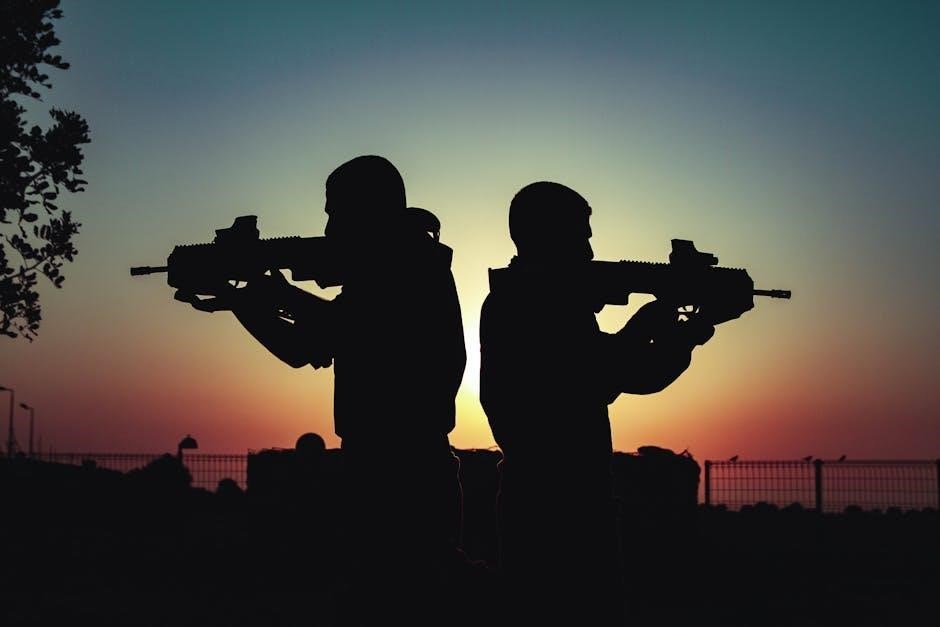This guide provides essential Armed Security Guard test questions and answers, helping candidates prepare effectively. It includes sample questions, detailed explanations, and study tips to ensure success.
Overview of the Importance of Armed Security Guard Training
Armed security guard training is crucial for ensuring public safety and legal compliance. It equips guards with the skills to handle firearms safely, respond to emergencies, and make ethical decisions. Proper training ensures they can de-escalate conflicts and protect people and property effectively. Without adequate training, security personnel may face legal consequences or fail to perform their duties responsibly. This training also prepares guards for real-world scenarios, ensuring they can act professionally under pressure. By mastering these skills, armed security guards contribute to a safer community and uphold the standards of their profession. Effective training is essential for both passing the certification exam and excelling in the field.
Why Preparation is Key to Passing the Exam
Preparation is vital for excelling in the Armed Security Guard exam, as it ensures a deep understanding of critical topics like firearms safety, legal responsibilities, and emergency protocols. Without proper preparation, candidates may struggle to grasp complex concepts, leading to poor performance. Effective study habits, such as reviewing practice questions and familiarizing oneself with the test format, build confidence and reduce exam anxiety. Additionally, preparation helps identify weak areas, allowing focused improvement. By leveraging study materials and practice exams, candidates can refine their knowledge and test-taking strategies. Thorough preparation not only enhances performance but also ensures compliance with legal and professional standards, making it indispensable for success.

How to Prepare for the Armed Security Guard Test
To prepare effectively, create a structured study plan, utilize recommended materials, understand the test format, and take practice exams to assess your readiness.
Recommended Study Materials and Resources
Utilize official study guides, online courses, and practice exams to prepare for the Armed Security Guard test. PDF resources, such as the Armed Security Guard Test Questions and Answers, offer comprehensive review materials. Online platforms provide interactive learning tools, while legal and safety manuals ensure understanding of regulations. Supplement your study with state-specific guidelines and real-world scenario simulations. Additionally, enroll in certified training programs for hands-on experience. Prioritize materials that cover firearms safety, legal protocols, and emergency response. Regularly review and practice with updated resources to stay informed and confident.
Understanding the Test Format and Structure
The Armed Security Guard test typically consists of multiple-choice questions designed to assess knowledge of safety protocols, legal responsibilities, and emergency procedures. The exam may include sections on firearms handling, conflict resolution, and crisis management. Candidates should expect a structured format with clear instructions and time limits. Familiarizing yourself with the test layout, such as question types and answer formats, can improve confidence and performance. Reviewing sample questions and understanding the scoring system are crucial steps in preparation. Knowing the test structure helps allocate time effectively and ensures a systematic approach during the exam. This understanding reduces anxiety and allows focus on demonstrating competence in critical areas of armed security. Proper preparation is key to success.
Common Topics Covered in the Test
The Armed Security Guard test covers firearms safety, legal responsibilities, emergency response, and crisis management, ensuring comprehensive knowledge for effective security operations.
Firearms Safety and Handling Procedures
Firearms safety and handling procedures are critical components of the Armed Security Guard test. These questions assess knowledge of proper weapon handling, storage, and usage. Key topics include safe loading/unloading techniques, trigger control, and muzzle awareness. Understanding firearm malfunctions and emergency procedures is also emphasized. The test evaluates adherence to safety protocols to prevent accidents and ensure responsible weapon use. Familiarity with legal guidelines regarding firearm deployment is crucial. Practice questions cover scenarios requiring immediate action, such as misfires or threats. Mastery of these concepts ensures guards can operate firearms safely and effectively in high-pressure situations, protecting themselves and others while maintaining professionalism and adherence to the law.
Legal and Ethical Considerations for Armed Security Guards
Legal and ethical considerations are fundamental to the role of armed security guards. The test evaluates knowledge of laws governing the use of force, search and seizure, and detainment procedures. Ethical dilemmas, such as impartial decision-making and respect for individual rights, are also assessed. Understanding legal boundaries ensures guards act within the law, avoiding liability or misconduct. Ethical practices promote professionalism and public trust. Questions may present real-world scenarios requiring guards to balance legal obligations with ethical responsibilities. Proper training and adherence to these principles are essential for maintaining safety and justice in various situations. This section ensures guards are prepared to handle challenges responsibly and lawfully, upholding both legal standards and moral expectations.
Emergency Response and Crisis Management
Emergency response and crisis management are critical skills for armed security guards. The test evaluates knowledge of protocols for handling active threats, medical emergencies, and natural disasters. Guards must understand evacuation procedures, communication strategies, and coordination with emergency services. Crisis management involves quick decision-making to de-escalate situations and ensure public safety. Questions may simulate real-life scenarios, testing the ability to prioritize actions and follow established guidelines. Proper training in emergency response ensures guards can react effectively, minimizing risks and protecting lives. This section of the exam prepares guards to handle unpredictable situations with confidence and professionalism, adhering to legal and ethical standards during crises.

Practice Tests and Sample Questions
Practice tests and sample questions are essential for understanding the exam format, identifying weaknesses, and building confidence. They provide real-world scenarios and help refine test-taking strategies effectively.
Benefits of Taking Practice Exams
Taking practice exams offers numerous advantages for armed security guard candidates. They familiarize individuals with the test format, helping them understand question types and time constraints. Regular practice improves time management skills, ensuring candidates can complete the exam within the allotted period. Additionally, practice exams reduce anxiety by simulating real test conditions, allowing candidates to build confidence. They also highlight areas where further study is needed, enabling focused preparation. By reviewing answers, candidates gain insights into common mistakes and refine their problem-solving strategies. Overall, practice exams are a proven method to enhance readiness and performance, leading to higher scores and greater success in obtaining the armed security guard certification.
Where to Find Reliable Practice Tests
Reliable practice tests for armed security guard exams can be found through official training programs, state licensing boards, and reputable online platforms. Many security training websites offer free or paid practice exams that simulate real test conditions. Additionally, textbooks and study guides often include sample questions and answers. Professional associations and forums dedicated to security professionals may also provide access to authentic practice materials. Ensure the source is credible and aligns with your state’s specific requirements. Utilizing these resources helps candidates familiarize themselves with the exam format and content, boosting their confidence and readiness for the actual test. Always verify the credibility of the source to avoid misleading information.

Test-Taking Strategies and Tips
Develop a study schedule, practice under timed conditions, and review weak areas. Stay calm, read questions carefully, and eliminate incorrect answers before selecting the best choice.
Time Management During the Exam
Effective time management is crucial for success in the armed security guard exam. Allocate time evenly to each question, ensuring you leave a few minutes for review. Start with questions you find easiest to build confidence and rhythm. Avoid spending too much time on a single question—move forward and return if time permits. Use the process of elimination to narrow down answers. Budget 1-2 minutes per question, depending on difficulty. Prioritize reading each question carefully to understand what is being asked. Manage stress by taking deep breaths and staying focused. Proper time management ensures you attempt all questions, maximizing your score potential.
How to Approach Multiple-Choice Questions
When tackling multiple-choice questions, start by reading each question thoroughly to understand what is being asked. Identify key terms and focus on the main idea. Eliminate obviously incorrect answers first to narrow down your options. Consider the context and logic behind each choice. If “all of the above” or “none of the above” are options, approach them cautiously, as they often require careful consideration. Avoid changing your initial answer unless you are certain it is wrong. Manage your time wisely, skipping difficult questions initially and returning to them later; Stay calm and systematic in your approach to maximize accuracy and confidence.
After the Test: What to Expect
After completing the exam, you will receive your results, indicating whether you passed or failed. Understand your score, review missed questions, and plan next steps accordingly.
Understanding Your Results and Next Steps
Upon receiving your test results, carefully review your score to determine if you met the passing threshold. If successful, you’ll be certified as an armed security guard, enabling you to apply for roles requiring this credential. If you didn’t pass, identify areas where you underperformed and focus your study efforts there. Many testing centers provide detailed score breakdowns, highlighting strengths and weaknesses. Use this feedback to improve your knowledge and retake the exam when ready. Additionally, check with your state’s licensing authority for specific requirements post-test, as procedures may vary. Properly understanding your results is crucial for advancing your career in security.
How to Address Common Mistakes
Identifying and correcting common mistakes is crucial for improving performance on the Armed Security Guard test. Review your test results to pinpoint areas where errors occurred. Focus on misunderstanding key concepts or misapplying procedures. For example, if you struggled with firearms safety, revisit the relevant sections in your study materials. Time management issues can also lead to mistakes; practice pacing yourself during practice exams. Additionally, ensure you fully understand the test format to avoid misreading questions. Retake practice tests to reinforce learning and build confidence. Addressing these errors systematically will enhance your readiness for the exam and improve your overall score. Continuous improvement is key to success.

Additional Resources for Continued Learning
Explore recommended reading, online courses, and updated guides to deepen your knowledge. Utilize practice exams, training manuals, and industry publications for ongoing skill development and exam preparation.
Recommended Reading and Online Courses
To enhance your preparation, consider enrolling in certified online courses that focus on armed security protocols and legal standards. Additionally, books like Security Guard Training Manual and Armed Security Guard Exam Prep offer in-depth insights and practical advice. Websites such as Coursera and Udemy provide structured courses on security procedures, firearms safety, and emergency response. These resources complement your study materials and ensure a well-rounded understanding of the subject matter. By combining theoretical knowledge with hands-on training, you can build the confidence and skills needed to excel in your role. Regularly updating your knowledge with industry publications and online forums will also keep you informed about the latest trends and regulations in armed security.
